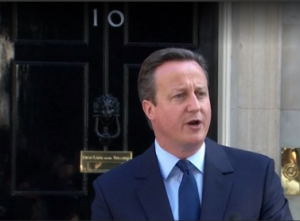
David Cameron’s legacy and leadership overran by Eurosceptics

Former UK prime minister’s tenure as Conservative leader simply highlighted a warm-up act before another Bullingdon Club boy Boris Johnson, blagged his way to his days at the top.
According to Johnson Cameron is genuinely clever and hard-working a “girly swot” but according to Cameron, Johnson who styles himself as the “Hulk” is a jealous man “ prone to paranoias” that influence his behaviour.
Cameron has real moral compass displayed by his and his wife Samatha’s caring for their son Ivan, who suffered from severe epilepsy and cerebral palsy and died aged six.
Cameron inherited a party that had become increasingly uncomfortable with Britain’s place in the EU, from 1951-73 was at the bottom of the OECD growth table has been granted membership of the then EEC a la carte. Once in customs union and later the single market the UK grew faster than Germany, France and Italy between 1973 and 2016.
But for several Conservatives Queen’s head was still on our bank notes and we still went to war at the behest of the US. John Major labelled the group of hardline “Tory Eurosceptics who plagued this time in office from 1990-97, as “bastards”.
Cameron who had worked hard to stop Conservative fixating about Europe, chose to try and manage internal dissent and not take it head on so every discussion in Brussels turned into a zero-sum game, but competently managed a coalition government with the Liberal Democrats between 2010-15 as public finances were rebuilt with spending cuts that were not quite bad as they sounded, and began a long-term reform of education and welfare. He also supervised the management of the 2012 London Olympics, a successful celebration of a genuinely global Britain. He legalised gay marriage and helped to lead a successful campaign against Scottish independence, the 2014 referendum.
Even before the critical decision to call a referendum, pitching plebiscitary against parliamentary democracy, Cameron did make some awful errors in his European diplomacy. In 2006 he withdrew his party ‘s MEPs from the centre-right European People’s party grouping in European Parliament. He writes “ need to get away from double speak of the past” that marked the premierships of Margaret Thatcher and John Major of rallying against Brussels.
This wholly unnecessary decision not only angered Angela Merkel, German Chancellor and other centre-right leaders who denied him a source of the political intelligence that might have prevented the embarrassing mistake in 2011, when his crude threats to veto a treaty change on the Euro blew up in his face.
Cameron writes that his thinking on Europe and the need for a referendum date back to that time. Yet he apologies for holding the 2016 Brexit Vote giving into pressure from rightwing Conservatives and Farage’s UK Independence party with a national enthusiasm for a European referendum. In 2015 general election which delivered a Tory majority Europe ranked seventh in the list of voter’s concerns. The ideal of winning a referendum to remain in the EU would see off Farage and Tory Brexiters was wrong.
The referendum campaign itself should not have been run from Downing Street and the case against leaving was put almost entirely in terms off economic forecasts with a hostile media. The lying and disloyalty of Michael Gove, Johnson and their Leave colleagues as Cameron accuses Gove of “ getting his hands dirty again and again” during the campaign.
Cameron’s memoirs are the record of how one huge egregious error, seeded and nurtured by the rightwing of his party produced a result that will split, demoralise and weaken Britain for years ahead.
